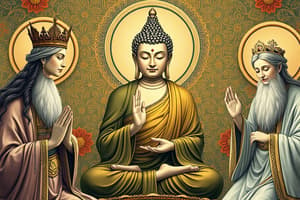Podcast
Questions and Answers
What is meant by 'Three Thousand Realms in a single moment of life'?
What is meant by 'Three Thousand Realms in a single moment of life'?
- It indicates that a single moment can reflect three thousand past lives.
- It signifies the ability to understand the teachings of multiple religions at once.
- It implies that three thousand people can achieve enlightenment simultaneously.
- It represents the complexity and diversity of experiences in one moment. (correct)
Who formulated the doctrine related to 'a single moment of life'?
Who formulated the doctrine related to 'a single moment of life'?
- Buddha Shakyamuni
- The Great Teacher Tien-t'ai (correct)
- Confucius
- Nichiren Daishonin
What is the primary objective of the doctrine of 'Nam-myoho-renge-kyo'?
What is the primary objective of the doctrine of 'Nam-myoho-renge-kyo'?
- To attain enlightenment for all people. (correct)
- To document the teachings of past spiritual leaders.
- To study various religions and find commonalities.
- To compare life forms across different dimensions.
In which writing did Tien-t'ai discuss the idea of 'Great Concentration and Insight'?
In which writing did Tien-t'ai discuss the idea of 'Great Concentration and Insight'?
What is defined as the physical aspect of life in the context provided?
What is defined as the physical aspect of life in the context provided?
Which function is responsible for interpreting information received from the outside world?
Which function is responsible for interpreting information received from the outside world?
What does the term 'Buddhahood' refer to in this context?
What does the term 'Buddhahood' refer to in this context?
How is volition connected to conception according to the provided content?
How is volition connected to conception according to the provided content?
What does 'a single moment' emphasize in relation to life?
What does 'a single moment' emphasize in relation to life?
Which concept suggests that enlightenment is accessible to everyone?
Which concept suggests that enlightenment is accessible to everyone?
Which of the following best describes conception in this context?
Which of the following best describes conception in this context?
What does the phrase 'ordinary people can attain Buddhahood' imply?
What does the phrase 'ordinary people can attain Buddhahood' imply?
What are the 'six sense organs' mentioned in the content?
What are the 'six sense organs' mentioned in the content?
How many realms does each rid in tum possess?
How many realms does each rid in tum possess?
What is the total number of realms mentioned across the one hundred worlds?
What is the total number of realms mentioned across the one hundred worlds?
What principle underlies the concept of the mutual possession of the Ten Worlds?
What principle underlies the concept of the mutual possession of the Ten Worlds?
What is implied when it is mentioned that the nine worlds have the potential for Buddhahood?
What is implied when it is mentioned that the nine worlds have the potential for Buddhahood?
Which of the following best describes 'three thousand realms in a single moment of life'?
Which of the following best describes 'three thousand realms in a single moment of life'?
How does the concept of the ten factors relate to the three thousand realms?
How does the concept of the ten factors relate to the three thousand realms?
What does 'the mutual possession of the Ten Worlds' suggest about the relationship between different realms?
What does 'the mutual possession of the Ten Worlds' suggest about the relationship between different realms?
What does the explanation of three thousand realms in a single moment convey about life?
What does the explanation of three thousand realms in a single moment convey about life?
What does 'manifest effect' refer to in this context?
What does 'manifest effect' refer to in this context?
Which statement best describes 'consistency from beginning to end'?
Which statement best describes 'consistency from beginning to end'?
How are the Ten Worlds related to the concept of causality?
How are the Ten Worlds related to the concept of causality?
What is indicated by a life manifesting in the state of Buddhahood?
What is indicated by a life manifesting in the state of Buddhahood?
What does the term 'realms of existence' encompass?
What does the term 'realms of existence' encompass?
What can influence the manifestation of a world of Buddhahood?
What can influence the manifestation of a world of Buddhahood?
What aspect does the concept of the Ten Worlds reflect?
What aspect does the concept of the Ten Worlds reflect?
How is a living being described in this content?
How is a living being described in this content?
What does 'appearance' refer to in the context of Nichiren Buddhism?
What does 'appearance' refer to in the context of Nichiren Buddhism?
Which term best describes the 'internal energy or inner potential' mentioned in Nichiren Buddhism?
Which term best describes the 'internal energy or inner potential' mentioned in Nichiren Buddhism?
In Nichiren Buddhism, what is meant by 'relation'?
In Nichiren Buddhism, what is meant by 'relation'?
What does 'latent effect' signify according to Nichiren Buddhism?
What does 'latent effect' signify according to Nichiren Buddhism?
How is 'internal cause' characterized in the philosophy of Nichiren Buddhism?
How is 'internal cause' characterized in the philosophy of Nichiren Buddhism?
Which of the following factors is NOT included in the seven factors of existence as per Nichiren Buddhism?
Which of the following factors is NOT included in the seven factors of existence as per Nichiren Buddhism?
What role does 'influence' play in Nichiren Buddhism?
What role does 'influence' play in Nichiren Buddhism?
The term 'nature' in Nichiren Buddhism refers to which aspect of a being?
The term 'nature' in Nichiren Buddhism refers to which aspect of a being?
Flashcards are hidden until you start studying
Study Notes
Three Thousand Realms in a Single Moment of Life
- "Three thousand realms in a single moment of life" refers to the interconnectedness of existence and enlightenment in Nichiren Buddhism.
- The concept implies that every moment of life encompasses infinite possibilities, enabling individuals to attain Buddhahood.
- This idea is foundational in the Gohonzon and aids practitioners to understand their potential for enlightenment.
Philosophical Principles
- Rooted in the teachings of the Great Teacher Tien-t'ai from China, particularly in the work "Great Concentration and Insight."
- Emphasizes the doctrine of "mutual possession of the Ten Worlds," where each world contains the potential for transformation into Buddhahood.
- The three thousand realms can be calculated as 10 worlds multiplied by 10 factors, multiplied by 3 realms of existence.
Key Components of Existence
- Ten Worlds: Represent various states of life, where every being possesses the potential to manifest any state in response to conditions.
- Causality: Life operates under the law of causality, where internal and external causes affect one's state and experiences.
- Manifest Effect vs. Latent Effect:
- Latent effect refers to unmanifested potential rooted within a person.
- Manifest effect emerges based on conditions and is observable in one's life.
Understanding Life and Change
- Life is viewed as a temporary union, emphasizing that identities and states are not fixed.
- Change is a constant, and each moment reflects the dynamic nature of one's existence.
- Conditions play a crucial role in the potential for an individual to manifest higher states of being, including Buddhahood.
The Nature of Existence
- The three realms of existence: realm of the five aggregates, realm of living beings, and realm of the Ten Worlds, demonstrate how different aspects of life are interconnected.
- Appearance, nature, and function of beings:
- Appearance refers to how life is perceived.
- Nature denotes the essence of beings and their innate qualities.
- Function relates to the actions and influences of beings in their environments.
Conclusion
- Through understanding and applying these principles, practitioners can cultivate their lives toward enlightenment.
- Each individual has the capacity to realize their Buddhahood, with the belief that change in one's heart can positively influence all facets of life.
Studying That Suits You
Use AI to generate personalized quizzes and flashcards to suit your learning preferences.




